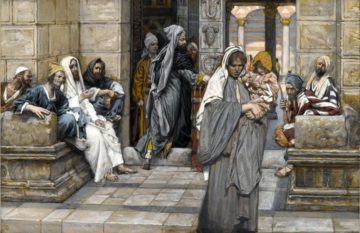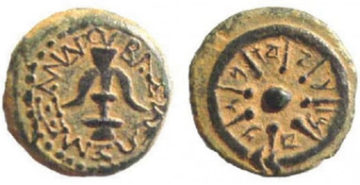Here are the gospel background and reflection questions for October 31st, as prepared by Franciscan spiritual director Fr. Paul Gallagher. This content is edited by Franciscan Sister of Christian Charity Sister Anne Marie Lom and Joe Thiel. The excerpts from the Sunday readings are prepared by Joe Thiel. To read or download the complete pdf with excerpts for your prayer, please click here: Franciscan Gospel Reflection November 7 2021 Excerpts are from the Lectionary for Mass for Use in the Dioceses of the United States of America, second typical edition © 2001, 1998, 1997, 1986, 1970 Confraternity of Christian Doctrine, Inc., Washington, DC. Used with permission. All rights reserved. No portion of this text may be reproduced by any means without permission in writing from the copyright owner. Photo: By James Tissot – Online Collection of Brooklyn Museum; Photo: Brooklyn Museum, 2008, 00.159.211_PS2.jpg, Public Domain, https://commons.wikimedia.org/w/index.php?curid=10957531
 Mark 12:38-44
Mark 12:38-44
In the course of his teaching Jesus said, “Beware of the scribes, who like to go around in long robes and accept greetings in the marketplaces, seats of honor in synagogues, and places of honor at banquets. They devour the houses of widows and, as a pretext, recite lengthy prayers. They will receive a very severe condemnation.”
He sat down opposite the treasury and observed how the crowd put money into the treasury. Many rich people put in large sums. A poor widow also came and put in two small coins worth a few cents. Calling his disciples to himself, he said to them, “Amen, I say to you, this poor widow put in more than all the other contributors to the treasury. For they have all contributed from their surplus wealth, but she, from her poverty, has contributed all she had, her whole livelihood.”
Background:
 It will be helpful to remember the gospel text from three weeks back, when James and John came to Jesus to ask that they be granted the seats on Jesus’ right and left when he comes into his glory. (Mark 10:35-45) Jesus’ instruction to his disciples was “… whoever wishes to be great among you will be your servant; whoever wishes to be first will be slave of all.” (Mark 10:43) Mark’s description of the scribes here is the total opposite of Jesus’ instruction and his own way of living among them. The scribes do not identify with the poor servant class, or even with the common people of the day. They seek positions among the elite. Jesus makes no attempt to hide his criticism, and it is likely that the scribes themselves would have overheard his remarks.
It will be helpful to remember the gospel text from three weeks back, when James and John came to Jesus to ask that they be granted the seats on Jesus’ right and left when he comes into his glory. (Mark 10:35-45) Jesus’ instruction to his disciples was “… whoever wishes to be great among you will be your servant; whoever wishes to be first will be slave of all.” (Mark 10:43) Mark’s description of the scribes here is the total opposite of Jesus’ instruction and his own way of living among them. The scribes do not identify with the poor servant class, or even with the common people of the day. They seek positions among the elite. Jesus makes no attempt to hide his criticism, and it is likely that the scribes themselves would have overheard his remarks.
Widows were among the lowest members of society. The word itself in Hebrew carries a meaning of one who is silent, unable to speak. That is because all women were expected to remain within the interior of the house while men occupied the public arena. The concerns of a woman were expressed by her father or husband. If a woman became a widow and had no married sons who could take her into his home, she would return to the house of her father or a brother. If none of these were possible, she was usually forced to beg. Widows had no status of their own. In this society, the care of widows became one of the basic values.
The second part of the gospel text for today is linked to the first by the word ‘widow.’ By putting the two texts next to each other, Mark emphasizes the self-indulgent behavior of the scribes. To support the temple treasury, thirteen trumpet-shaped chests were placed in the courtyard. When coins were placed into these, the sounds of the coins could be heard by others. Donations of large coins made significant noise as they fell to the bottom. The coin that the widow used was the smallest in use at the time; its value was about 1/64 of the daily wage of a laborer. By including the detail that she placed two coins into the treasury, Mark makes sure his audience is aware that her intention is to hold nothing back, not even one of her small coins.
Jesus’ comments have a tone of lament, rather than praise for the widow’s generosity. The widow, like other people of the day, has been taught by the scribes the value of sacrificial giving. The temple offerings are designated to be used for the care of the needy. But there is a hidden implication that the scribes have been using some of the funds to enhance their own appearance.
Truly the widow has given all that she had to live on, demonstrating her total trust in God to take care of her. Her gift will not enhance her status or reputation, like the large gifts of the others. The widow’s gift is a gift of herself, her very life in service to God. Her gift will not affect anyone else but herself. While the widow may have great trust in God, the larger situation of the religious leadership of the day is troubling Jesus.
Reflection Questions:
- What are some of the reasons people choose to give to charities, churches, and institutions? What are some of the reasons you choose to make donations?
- Are there reasons that you do NOT make donations?
- Who are the people without a voice in your community?
- Are there also people in your community who make a special effort to hear the voice of those who are usually not heard?
- Can you imagine Jesus in this gospel standing up in the public area, maybe right outside the temple in Jerusalem, with people on their way to and from the temple, with a group gathered to hear him teach, and maybe some others listening but more at a distance. Maybe you can even hear the sound of the coins being dropped in the metal horn-shaped treasuries in the distance. Can you imagine other sounds too? And smells of animals and other people and food? What is the mood of the people going to the temple, those coming from the temple, those listening to Jesus, and those more at a distance? What is the mood of Jesus himself, and of you yourself? Does the widow hear Jesus’ teaching today? If so, what happens to her as she hears Jesus talk about her and her offering? What happens within the crowd of listeners? Among those at a distance? Within you?
- Can you take some time to talk with God about your awareness of yourself as you reflected on this gospel text? What would you like to say to God? How does God want to respond to you?



Article Comments:
Fr. Placid Stroik, OFM 11/05/2021 @ 9:45 pm
Great call to generosity of oneself, without counting the cost and acting with trust that eventually the gift of oneself will bring good to others …. Recently I had two opportunities to reach out with money to people who said they were in need. I gave both times and both times I later wondered if I was taken advantage of by people who were con- artists. After these moments I was reading about Bishop Fulton Sheen’s attitude about giving to those in need. His niece raised the question: “How do you know they really need that handout of money?” Bishop Sheen’s response…” not to give is too great a risk to take”. I am at peace with that approach and attitude of Bishop Sheen. Sounds like that was the approach of the Widow in this Gospel. Perhaps Bishop Sheen got that approach from spending time with the Widow which is what I plan to do more of.